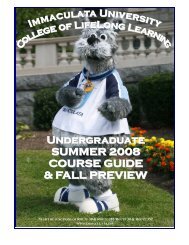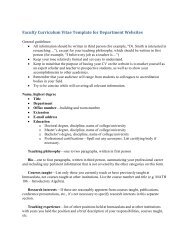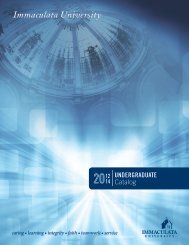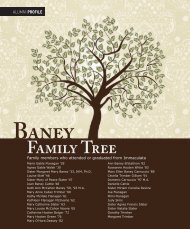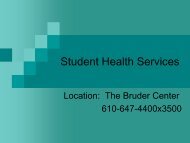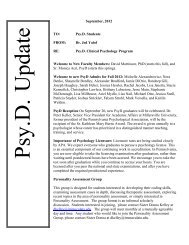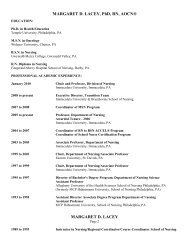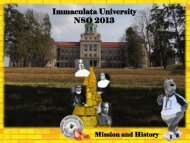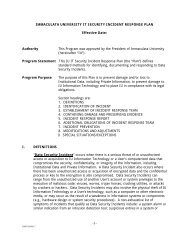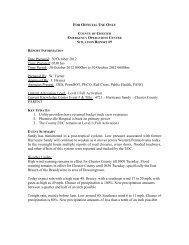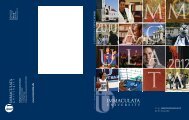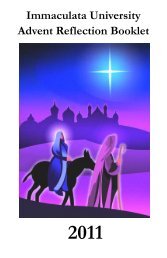8529 Cat.qxd - Immaculata University
8529 Cat.qxd - Immaculata University
8529 Cat.qxd - Immaculata University
You also want an ePaper? Increase the reach of your titles
YUMPU automatically turns print PDFs into web optimized ePapers that Google loves.
Through lectures and discussions led by local school personnel, theprospective teachers are given the opportunity to become familiarwith their professional obligations and benefits. Current trends incurricula and methods are considered and explained.A fee is charged for Student Teaching. No refund is made toanyone who withdraws from student teaching after pre-registrationhas been completed for this assignment.Applications for student teaching must be made by October 15prior to student teaching (Fall semester of junior year).Special Education: Students are required to complete a 30-hourpracticum during EDU 383 (ordinarily second semester of senior year).TEACHER CERTIFICATIONAll teacher education programs, elementary, early childhood,special education, and secondary, offered at <strong>Immaculata</strong> <strong>University</strong>,have been approved by the Pennsylvania Department of Education.Graduates who have successfully completed an approved programand have been recommended by <strong>Immaculata</strong> <strong>University</strong> are eligiblefor a Pennsylvania Certificate to teach. Students not recommendedfor certification may appeal through the Campus ReviewCommittee.<strong>Immaculata</strong> <strong>University</strong> makes every effort to help a studentprepare to teach in a state other than Pennsylvania. The student isresponsible for ascertaining the requirements of that state.All College of LifeLong Learning and transfer students seekingcertification should contact the appropriate advisor in the EducationDepartment on admittance.FIFTH-YEAR PROGRAMStudents who graduate with certification and a GPA of 3.5 maypursue a Master’s Degree in Educational Leadership during a fifthyear of study.200. Topics in Education (1-3)Selected topics to enrich the understanding of a variety ofeducational issues.201. Sophomore I Field Experience (0)Students participate in 30 hours of observations in varied schoolsand grade levels.202. Sophomore II Field Experience (0)Students participate in a 30-hour field experience in an urban setting.203. Junior I Field Experience (0)Students participate in a 30-hour field experience with initial teachingand managing responsibilities (in conjunction with EDU 310).204. Junior II Pre-Student Teaching (0)Students participate in a 10-day pre-student teaching experience inthe same classroom in which they will complete their student teaching.301. Social Foundations of Education (3)Extensive study of the school in contemporary America withemphasis on the three primary societies of family, church, and statein the education of children.302. Educational Psychology (3)Study of human development as it relates to the learningenvironment. Introduction to learning and motivation theories, aswell as the study of educational processes. Investigation ofinformal assessment procedures with attention to individualdifferences as well as appropriate use of various kinds of formalassessments including educational and psychological assessment,criterion-referenced and standardized tests. Computer literacy,including word processing, Internet use, and participation in onlinecomputer-enhanced experiences, is required.310. Orientation to Teaching (3)Approaches to teaching and learning at all grade levels. Topicsinclude: objectives of instruction, lesson planning, higher orderthinking, class management, and assessment. Effective teachingstrategies applicable to all content areas are discussed. A 30-hourfield experience (EDU 203) is required.325. Student Teaching: Secondary (6)See Field Experiences and Student Teaching above.(Fee required)330. Reading in the Content Areas (3)An examination of instructional strategies that relate to readingin middle and secondary school content areas. The course willprovide an overview of the developmental reading process, withmethods for promoting students’ learning and thinking withreading materials.331. Creative Thought and Expression (3)An examination of the current state and national standardsgoverning music, art, drama, and physical education for theelementary classroom. Resources for these curriculum areas will bestudied and evaluated. Students’ preparation and presentation ofintegrated units of study for these areas will also be developed.338. Children’s Literature (3)Introduction to various types of literature for students in gradesK-6. Emphasis on evaluation, appreciation, and presentation.Extensive reading on selected levels. Examination of crosscurricularliterature and technology resources.341. Survey of Curriculum Standards (3)Examination and discussion of current state and nationalstandards governing the disciplines of social studies, mathematics,and science in the elementary classroom. Study of resources used inteaching content, attitudes, and skills in these areas. Studentpreparation and presentation of materials for these curriculum areas.346. Student Teaching: Elementary (6)See Field Experiences and Student Teaching above.(Fee Required)347. Reading and Writing Connections (3)Integration of the language arts curriculum (K-6) will beconsidered. Various methods and techniques for teaching andassessing reading and writing in the elementary school will bestudied and evaluated. Emphasis will focus on the developmentalaspects of the language arts from emergent literacy to content areareading.361. Early Childhood Education I (3)An introduction to the field of early childhood education withemphasis on philosophy, program planning, the importance of play,and the curricular implications of the emotional and physicaldevelopment of young children.362. Early Childhood Education II (3)A continuation of Education 361 with emphasis on the curricularimplications of the social, intellectual, and creative development ofyoung children. Also includes working with parents of youngchildren. (Prerequisite EDU 361).52



